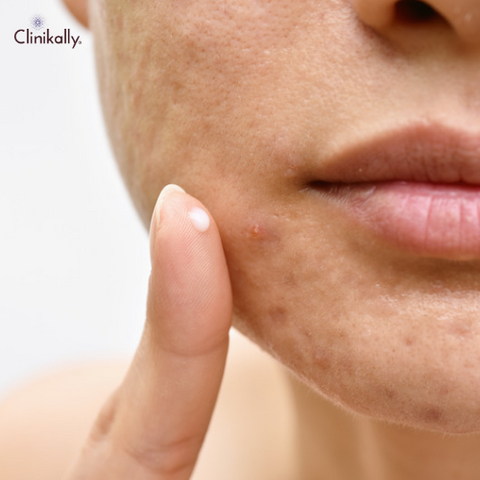Lycopene has gained significant attention in recent years as a potential game changer in skincare. This powerful antioxidant, primarily found in tomatoes and other red fruits, has been the focus of numerous studies exploring its benefits for skin health. With its impressive properties, lycopene has the potential to revolutionize the skincare industry.
Introduction to Lycopene: Nature's Powerful Antioxidant

Lycopene is a naturally occurring pigment that belongs to the carotenoid family. It is responsible for giving certain fruits and vegetables their vibrant red color, such as tomatoes, watermelon, and pink grapefruit. As a potent antioxidant, lycopene helps plants protect themselves from damage caused by sunlight and other environmental factors.
In recent years, scientists have discovered that lycopene also offers numerous benefits when applied topically or ingested. Its antioxidant properties help neutralize harmful free radicals in the body, which are known to contribute to aging and various diseases. By counteracting oxidative stress, lycopene supports overall health and plays a vital role in promoting skin wellness.
One of the key advantages of lycopene in skincare is its ability to protect the skin from damage caused by UV radiation. Sun exposure can lead to premature aging, wrinkles, and skin cancer. Studies have shown that lycopene can help reduce the harmful effects of UV rays by inhibiting oxidative damage and inflammation in the skin.
Additionally, lycopene has been found to have anti-inflammatory properties, making it beneficial for individuals with sensitive or acne-prone skin. It helps calm redness, soothe irritation, and promote a more even complexion.
Another exciting aspect of lycopene is its potential in promoting collagen synthesis. Collagen is a protein responsible for maintaining the structure and elasticity of the skin. As we age, collagen production decreases, leading to sagging skin and the formation of wrinkles. Lycopene has been shown to stimulate collagen production, which can help improve skin firmness and reduce the appearance of fine lines.
Moreover, lycopene's antioxidant properties contribute to its ability to support skin rejuvenation and overall skin health. By scavenging free radicals and reducing oxidative stress, it can help slow down the aging process and promote a youthful complexion.
Lycopene is available in various skincare products, including serums, creams, and oils. These formulations allow for direct application to the skin, maximizing the absorption and benefits of lycopene.
What is Lycopene?
Lycopene is a natural pigment and a member of the carotenoid family, responsible for giving certain fruits and vegetables their vibrant red color. It is predominantly found in tomatoes, but can also be found in other red fruits such as watermelon, pink grapefruit, and guava. Lycopene is a highly potent antioxidant, which means it helps protect cells from damage caused by harmful free radicals.
Unlike some other carotenoids, such as beta-carotene, lycopene does not convert to vitamin A in the body. However, its exceptional antioxidant properties make it valuable for promoting overall health and well-being.
Lycopene is a fat-soluble compound, meaning it is better absorbed by the body when consumed with a source of dietary fat. Cooking or processing tomatoes can actually increase the availability of lycopene, making it easier for the body to absorb.
In addition to its natural occurrence in fruits and vegetables, lycopene is also available in supplement form and as an ingredient in various skincare products. The concentration of lycopene in these products can vary, and it is often combined with other beneficial compounds to enhance its effectiveness.
Sources of Lycopene
Lycopene is predominantly found in various fruits and vegetables, with tomatoes being the most well-known and abundant source. However, there are several other sources where lycopene can be obtained. Here are some common sources of lycopene:
-
Tomatoes: Tomatoes, especially cooked or processed forms like tomato paste, sauce, and puree, are rich in lycopene. The concentration of lycopene in tomatoes increases as they ripen, with the highest levels found in fully ripe tomatoes.
-
Watermelon: Red-fleshed watermelon contains a significant amount of lycopene. This juicy fruit is not only refreshing but also provides a natural source of this beneficial compound.
-
Pink Grapefruit: The vibrant pink or red flesh of grapefruits contains lycopene. Enjoying a fresh grapefruit or incorporating its juice into your diet can provide a dose of lycopene.
-
Guava: Guava is a tropical fruit known for its unique flavor and high nutritional content. It is also a good source of lycopene, offering an additional way to incorporate this antioxidant into your diet.
-
Papaya: Papaya, particularly the ripe red or orange variety, contains lycopene. This tropical fruit is not only delicious but also provides various other health benefits.
-
Pink or Red Berries: Certain berries, such as pink or red varieties of strawberries, raspberries, and cherries, contain lycopene in smaller amounts. While the levels may be lower compared to other sources, these berries offer additional nutrients and antioxidants.
-
Supplements: Lycopene is available in supplement form, allowing individuals to obtain a concentrated dose of this antioxidant. These supplements can be found in various formulations and strengths, but it is advisable to consult with a healthcare professional before starting any new supplement regimen.
It is important to note that the bioavailability of lycopene can be enhanced by consuming it with a source of dietary fat. For example, adding a drizzle of olive oil to tomato-based dishes can improve the absorption of lycopene by the body.
Incorporating lycopene-rich foods into your diet can provide a natural and balanced way to benefit from this powerful antioxidant. Enjoying a variety of fruits and vegetables, particularly those mentioned above, can help ensure an adequate intake of lycopene and support overall health and well-being.
The Many Facets of Lycopene for Skin Health

Lycopene, a natural antioxidant found in tomatoes and other red fruits, has been gaining recognition for its multifaceted benefits in promoting skin health. This remarkable compound has demonstrated a range of properties that contribute to its effectiveness in skincare. From its ability to protect against UV damage to its anti-inflammatory and collagen-stimulating effects, lycopene offers a comprehensive approach to achieving and maintaining healthy, radiant skin. In this section, we will delve into the various facets of lycopene and explore how it can positively impact different aspects of skin health.
Lycopene as a Potent Antioxidant: Combating Free Radicals
As a powerful antioxidant, lycopene neutralizes harmful free radicals that can cause oxidative stress and cell damage. This damage manifests as wrinkles, fine lines, and other signs of aging on the skin. It can also lead to more serious skin conditions like skin cancer. By scavenging free radicals, lycopene preserves skin health and delays aging.
Lycopene's Role in Anti-Aging and Collagen Production
In addition to protecting the skin from free radicals, lycopene promotes collagen production. Collagen is a critical protein that provides structure and elasticity to the skin. As we age, our natural collagen production decreases, leading to sagging skin and wrinkles. Lycopene's stimulation of collagen synthesis helps maintain skin firmness and elasticity, contributing to a youthful appearance.
The Sun-Protection Capabilities of Lycopene
Lycopene, a natural pigment found in certain fruits and vegetables, has garnered attention for its potential sun-protection capabilities. While it is not a substitute for sunscreen, lycopene's antioxidant properties make it a valuable addition to sun care routines. Here's a closer look at how lycopene can contribute to protecting the skin from the harmful effects of the sun:
-
UV Radiation Protection: Lycopene has been found to absorb and neutralize harmful ultraviolet (UV) radiation from the sun. UV radiation is a major cause of skin damage, including sunburn, premature aging, and an increased risk of skin cancer. Lycopene's ability to absorb UV rays helps reduce the penetration of these damaging rays into the skin.
-
Anti-Inflammatory Effects: Sun exposure can trigger inflammation in the skin. Lycopene possesses anti-inflammatory properties that can help calm and soothe the skin, minimizing redness and irritation caused by UV radiation. By reducing inflammation, lycopene supports the skin's natural healing process.
-
Antioxidant Defense: Lycopene is a powerful antioxidant that helps neutralize free radicals generated by UV exposure. Free radicals are unstable molecules that can cause oxidative stress, leading to cellular damage and premature aging. Lycopene's antioxidant activity helps protect the skin cells from this damage, promoting a healthier complexion.
-
DNA Protection: UV radiation can cause DNA damage in skin cells, increasing the risk of mutations and potentially leading to skin cancer. Lycopene's ability to scavenge free radicals and reduce oxidative stress can help safeguard the integrity of DNA, reducing the risk of cellular mutations.
While lycopene offers sun-protection benefits, it should not be considered a standalone method of sun protection. It is crucial to follow established sun-safe practices, including wearing broad-spectrum sunscreen, seeking shade, and wearing protective clothing. Combining lycopene-rich foods or lycopene-containing skincare products with these sun-safe measures can provide an additional layer of defense against the damaging effects of the sun.
It is worth noting that lycopene's sun-protection capabilities are more effective when consumed or applied topically over an extended period rather than as a one-time application. Consistent incorporation of lycopene into your diet or skincare routine can help build up its protective effects over time.
Exploring the Health Benefits of Lycopene Beyond Skincare

Lycopene, a potent antioxidant predominantly found in tomatoes and other red fruits, has gained recognition for its remarkable health benefits that extend far beyond its impact on skincare. Scientific research has uncovered a multitude of advantages associated with lycopene consumption, showcasing its potential to promote overall well-being and combat various health conditions. In this section, we will delve into the diverse health benefits of lycopene and explore the ways in which it positively influences different aspects of our health, transcending its role in skincare. From its potential in reducing the risk of cancer and promoting cardiovascular health to its positive effects on eye health and anti-inflammatory properties, lycopene proves to be a truly remarkable compound with wide-ranging health implications.
Lycopene's Contribution to Heart Health
Not limited to skin benefits, lycopene also contributes to heart health. Its antioxidant activity reduces oxidative stress, a key player in heart disease development. By lowering oxidative stress and inflammation, lycopene supports healthy heart function and potentially reduces the risk of heart disease.
The Anti-Inflammatory Power of Lycopene
In addition to its antioxidant properties, lycopene exhibits anti-inflammatory properties. It inhibits the production of inflammatory cytokines, compounds that promote inflammation. This makes lycopene a potential ally in managing chronic inflammatory diseases, including arthritis and inflammatory skin conditions like eczema and psoriasis.
Dietary Lycopene: Aiding Overall Health
Beyond its impact on specific areas such as skincare and sun protection, dietary lycopene offers a range of health benefits that can contribute to overall well-being. By incorporating lycopene-rich foods into your diet, you can harness its potential to support various aspects of your health. Here's a closer look at how dietary lycopene can aid overall health:
-
Antioxidant Power: Lycopene is a potent antioxidant that helps combat the harmful effects of free radicals in the body. Free radicals can cause cellular damage and contribute to various chronic diseases, including cardiovascular disease, cancer, and neurodegenerative disorders. By neutralizing free radicals, lycopene helps protect cells and tissues from oxidative stress, promoting overall health.
-
Cardiovascular Health: Several studies have shown that lycopene intake is associated with a reduced risk of cardiovascular disease. Lycopene's antioxidant properties help prevent the oxidation of LDL cholesterol, reduce inflammation, and improve blood vessel function. These factors contribute to a healthier cardiovascular system and a decreased risk of heart attacks and strokes.
-
Cancer Prevention: Lycopene's potential in reducing the risk of certain cancers, particularly prostate, lung, and stomach cancers, has been extensively studied. Its antioxidant and anti-inflammatory properties, along with its ability to inhibit cancer cell growth and promote cell cycle arrest, make it a promising component in cancer prevention. However, more research is needed to fully understand its mechanisms and optimal dosage for different types of cancer.
-
Eye Health: Lycopene has been associated with a reduced risk of age-related macular degeneration (AMD) and cataracts, two common eye conditions that can lead to vision impairment. Its antioxidant properties help protect the retina and lens of the eye from oxidative damage, supporting long-term eye health.
-
Bone Health: Some studies suggest that lycopene may play a role in promoting bone health. It is thought to help reduce bone resorption, maintain bone density, and potentially prevent osteoporosis. However, further research is necessary to establish a definitive link between lycopene and bone health.
Incorporating lycopene-rich foods into your diet is a natural and nutritious way to obtain the health benefits of this powerful antioxidant. Tomatoes, particularly cooked or processed forms, watermelon, pink grapefruit, guava, and certain berries are excellent sources of lycopene. Remember to consume lycopene-rich foods with a source of dietary fat to enhance absorption.
Harnessing the Benefits of Lycopene for Skincare

Lycopene, a powerful antioxidant found in tomatoes and various red fruits, has emerged as a compelling ingredient in the realm of skincare. Its numerous benefits and potential for enhancing skin health have captured the attention of researchers and skincare enthusiasts alike. Lycopene's remarkable properties, such as its ability to protect against UV damage, reduce inflammation, stimulate collagen production, and promote overall skin rejuvenation, make it a sought-after component in skincare products. In this section, we will explore how lycopene can be harnessed to optimize skincare routines, unlock its full potential, and achieve healthy, glowing skin.
Enhancing Skin Firmness with Lycopene
Due to its antioxidant properties and ability to stimulate collagen production, lycopene plays a vital role in maintaining skin firmness. By combating the destructive free radicals and boosting collagen, lycopene aids in preserving the skin's structural integrity. Regular use of lycopene-infused skincare products can result in tighter, firmer skin.
Improving Skin Tone and Elasticity with Lycopene
Another fantastic benefit of lycopene for skin health involves improving skin tone and elasticity. Lycopene helps balance skin coloration, reducing hyperpigmentation and providing a more uniform skin tone. Furthermore, by boosting collagen production, lycopene improves skin elasticity, thereby reducing sagging and promoting youthful-looking skin.
Incorporating Lycopene into Your Skincare Routine
Adding lycopene to your skincare routine can be as simple as including more lycopene-rich foods in your diet. Additionally, several skincare products such as creams, serums, and sunscreens contain lycopene. When selecting such products, look for those with natural ingredients and ensure lycopene is listed as one of the main components. As always, conduct a patch test to determine skin compatibility with any new skincare product.
Understanding the Precautions and Proper Usage of Lycopene

While lycopene offers numerous benefits, it's important to consider some precautions. Although rare, allergic reactions to lycopene can occur, particularly when used topically. These may manifest as hives, itching, or redness. If you experience such symptoms, discontinue use and seek medical attention.
If consumed in excess, lycopene might cause side effects like bloating, diarrhea, indigestion, or loss of appetite. It's important to follow recommended dosages when taking lycopene supplements and to consult a healthcare professional before starting any new dietary supplement regimen.
Remember that while lycopene can protect the skin from sun damage, it doesn't replace a broad-spectrum sunscreen. You should still apply sunscreen daily and take other sun protection measures, such as wearing a hat or seeking shade during peak sunlight hours.
In conclusion, lycopene presents an exciting potential in the world of skincare and overall health. Its antioxidant, anti-aging, and sun-protection capabilities, along with its benefits for heart health and overall wellbeing, make it a compelling addition to any skincare or health regimen. As with any supplement or skincare ingredient, understanding how to use it properly and taking necessary precautions is key to harnessing its benefits safely and effectively. With the right approach, lycopene can be a game changer in achieving healthy, radiant skin and robust overall health.








































